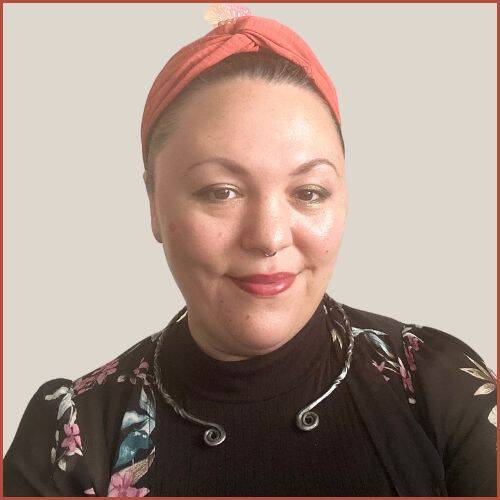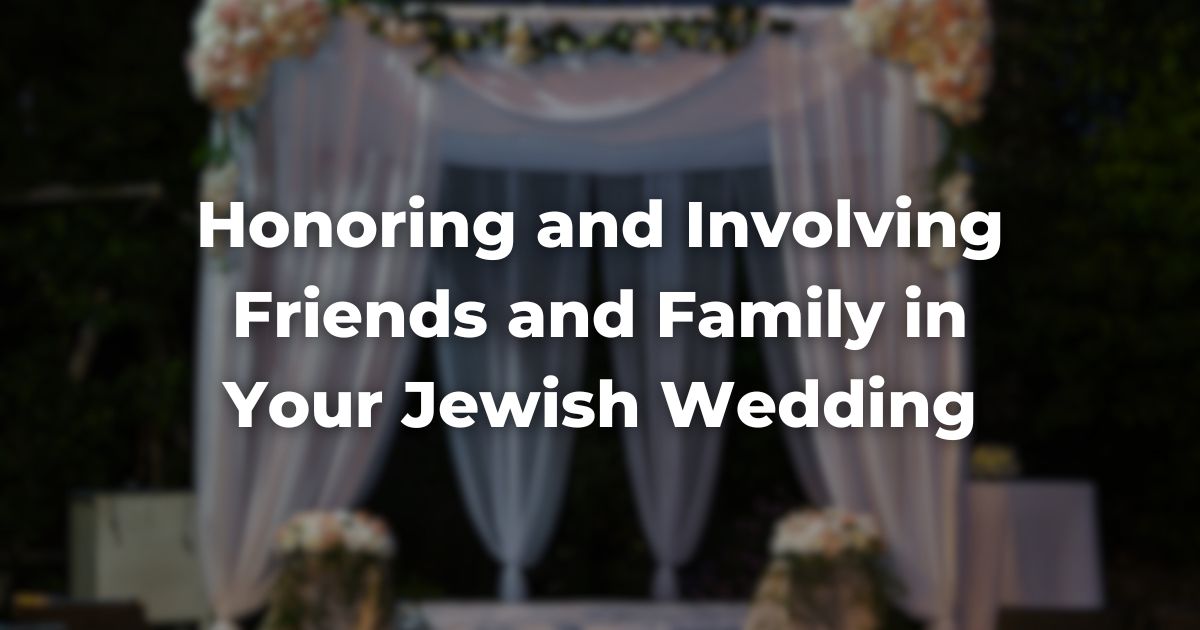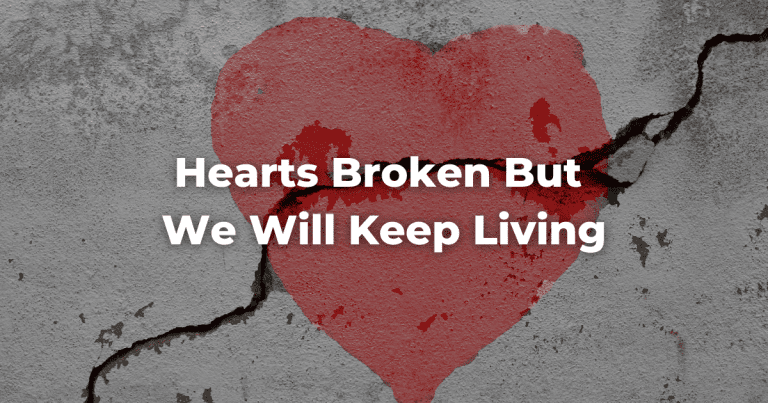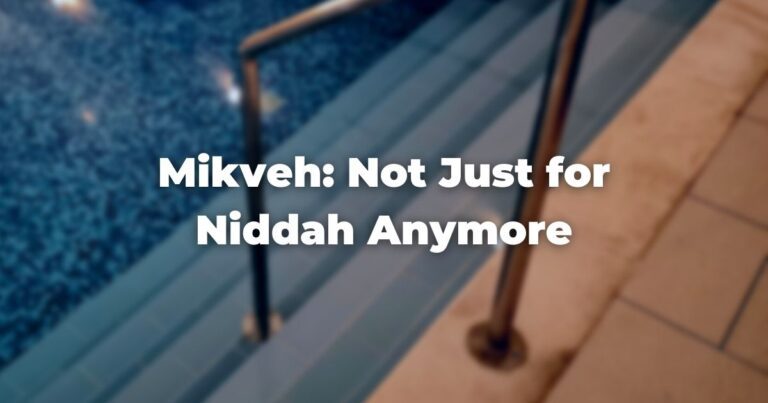Planning a wedding can be a pain in your tuchus (backside) — it’s no secret.
And while I can’t advise you which caterer is going to please everyone, or how to create a seating chart that will end a family feud, I have some recommendations on how (and when) to involve your loved ones in your Jewish wedding.
Involving the people you love the most is important! After all, they’ve been with you through all the highs and the lows that brought you to this pivotal moment.
First, let’s talk about at what point in the ceremony is a good time.
The two essential elements of a traditional Jewish wedding are the giving of the ring (historically this was the groom giving it to the bride) and signing of the ketubah (the marriage contract).
You can include readings that are meaningful to you, your spouse, and the reader at basically any point in the ceremony. Just check with your officiant to make sure it doesn’t disrupt the flow.
Anything else surrounding those two elements is a custom, which is good news for you! That means that there are plenty of opportunities outside the ceremony to involve friends and family.
One note of caution for those with non-Jewish family or friends:
Unfortunately, a gentile cannot perform any ritual component of a traditional Jewish wedding. From a halakhic or Jewish legal standpoint the wedding would be invalid if they did.
Wedding plans get complicated in a hurry when you come from a mixed family, I know. But this is not to be exclusionary or to hurt anyone’s feelings. It’s to ensure that your marriage is binding according to halakha.
Halakha isn’t just about rules, it’s about taking part in the larger Jewish narrative. Though halakha can vary depending on the community, it’s been a major force unting us as a people through centuries of exile and challenges that could have relegated Jews to history books.
And here we still are—it’s worth honoring that!
What’s your priority? What’s your spouse’s priority?
You likely both have biological family and chosen family, so it might be useful to explore which connections are important in terms of starting points: biological relation or soul connection. Remember, this is your wedding. You want to feel good about your choices and not like you’re trying to please others.
It may sound silly or obvious, but lists can be your best friend when making these difficult decisions. Having it on a piece of paper makes it clear and concrete, and that can really help manage stress as you plan.
If writing isn’t your thing, maybe a log of voice memos is more useful. The point is that you want to do everything you can to avoid pre-wedding stress waking you up at 4am.
Communicate with your spouse-to-be. Each of you will undoubtedly have a few people in mind you want to honor, so it’s best to be upfront about all the people you’re considering.
Before the ceremony at the Tisch
Tisch is a Yiddish term (literally meaning ‘table’), and it’s a custom of Ashkenazi origin. Think of it like a pre-game party before the ceremony when people get together to make a l’chaim (a toast), share words of TorahRefers to the first five books of the Hebrew Bible, the Tanakh, also called the Five Books of Moses, Pentateuch or the Hebrew equivalent, Humash. This is also called the Written Torah. The term may also refer to teachings that expound on Jewish tradition. Read more, and celebrate the couple about to be married.
In Sefardi (particularly Moroccan communities), this pre-wedding get together is called a hinnah, and it’s sometimes bigger than the actual wedding! This is also a time of celebrating the couple, giving blessings, and making toasts.
While it used to be that only the groom would have a tisch, these days it is (thankfully) more common for both spouses to have their own tisches. Some couples even do a tisch together!
You and your spouse decide who speaks. Though, if your worried about time (or you’re a planner and want to lessen your anxiety) it’s acceptable to have a list of who is going to give a blessing, offer a word of Torah, or do their teary-eyed, “When I saw Sarah our first day of orientation in college I knew we’d be best friends for life…” speech.
Pro tip: another great way to lessen your wedding stress and honor someone is appointing a “Tisch captain.” If you have a friend who’s familiar with this custom they’ll basically be your MC at the tisch. This ensures things move along smoothly so the only thing you and your spouse need to do is bask in joy of the moment.
Bedecken
This is an old Ashkenazi custom. It’s a short ritual before the ceremony in which the groom covers the bride’s face with a veil. It’s based on Genesis 24:66 in which Rebecca veils herself when she first meets Isaac, her betrothed. Symbolically, this means that the groom loves the bride for more than just her physical beauty. Physical beauty changes with time, but the soul’s beauty is undimmed and eternal.
Since this is a custom (and not Jewish law) same-sex couples can also do this if it resonates. It’s a wonderful sentiment — no matter the gender of the partners.
It’s also a fantastic opportunity for a parent—or another family member—to give a blessing. They can speak before the veiling, after the veiling, or both! However you and your spouse feel creates the most meaningful moment.
As with the tisch, I highly recommend having a clear idea of who’s been given the honor of speaking/giving a blessing and appointing a captain (if you have more than one person). This could be your officiant, or another friend or family member.
This moment is one of many on your wedding day celebrating the two of you, and you want to be able to savor it!
Under the Huppah (the wedding canopy)
One of the easiest (and most popular) places to include friends and family is during the sheva brakhot.
Sheva brakhot is Hebrew for ‘seven blessings’ and that’s exactly what this is: seven different blessings celebrating and sanctifying the union (traditionally of bride and groom) and their upcoming life together.
The sheva brakhot are normally said when you and your spouse stand together under the huppah, right before the iconic smashing of the glass.
Pro tip: the text is in Hebrew, and some of it is tricky. Something you can always do is have your officiant read the original. But, if you have friends and family that are comfortable enough with Hebrew, this could also be their opportunity. Whatever you and your spouse are discussing though, consult your officiant.
Also keep in mind that the sheva brakhot are considered a ritual component, which means they must be read by a Jewish person. But don’t despair if you non-Jewish friends and family to honor! They can participate in the sheva brakhot in a different way.
You can invite non-Jewish friends and family to read them in English or give a custom blessing in lieu of one of the traditional seven. A custom blessing would be like a wish for the two of you as you embark on your new life together. In some cases this can be even more powerful since it’s tailor-made to your story and how you move through the world together.
Again, consult with your officiant as you work through the details. If nothing else you want to keep them in the loop.
Remember: this is your day and while family dynamics can be hard to navigate, you’re allowed to have your priorities.
Who to involve
Speaking of priorities, let’s be real: you can’t involve everyone in the ceremony (no matter how much you want to) if you want to avoid taking three hours. When it comes to including friends and family, it’s best if you limit participants to your inner circles.
As I said above, this is your day, and you want it to be meaningful. Drawing boundaries can be really challenging — especially in the case of family. But it’s empowering if and when you do, because standing in your authenticity always feels better.
This wedding is not just a celebration, it’s a lifecycle event for you and your spouse. Though you may have already been together for a few years, the fact is that you’ll be different people on the other side of this. The wedding marks that huge transition, so by definition this needs to be something that you find meaningful.
The wedding is symbolic of the life you’ve built and are building together. It’s ok for your ceremony to be a blend of law, tradition, and personal flair; that reflects who you are as a couple and you should be proud of that!
God willing, you will only get married once, so you want to do it in a way that doesn’t leave you with regrets.
You likely have pressures and obligations when it comes to your wedding. That being said, this is also your permission to make the choices that feel authentic to you and your spouse.
There is a balance to be struck, and so it can be! And if you’re having trouble as you’re planning just ask yourself: who am I making this choice for?
You know your family best, and, at the end of the day, what matters most is that you can live with your choices.
Author
-

Malka Michél was born and raised in Honolulu, Hawaii. She is the proud daughter of an Ashkenazi father and Sephardic mother with Converso roots. She was a fellow in the first cohort of the Exploring Judaism's Writer's Fellowship. Malka regards her upbringing on the western extreme of the American Jewish Diaspora as having an enormous influence on her outlook as a Jew and the deep spirituality she cultivated as a child. As an intuitive and highly creative and soul, it was natural for Malka to pursue degrees in Western Classical music and performance. Seeking to reclaim a critical part of her Jewish identity, Malka taught herself Hebrew and then completed three years of cantorial school at Hebrew Union College in Jerusalem and New York. During that time, Malka fell in love with Hazzanut but longed to know more about the rich, beautiful and often challenging world of Jewish text. So, in 2020 Malka began her journey at the Ziegler School for Rabbinic Studies in Los Angeles. Malka sees her circuitous journey to the rabbinate as essential in shaping her as a person and a rabbi.
View all posts




